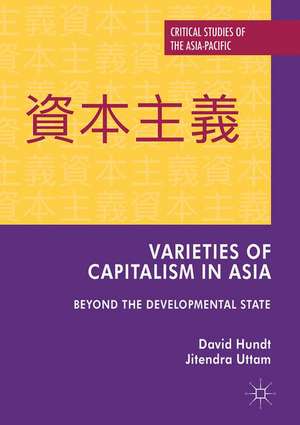Varieties of Capitalism in Asia: Beyond the Developmental State: Critical Studies of the Asia-Pacific
Autor David Hundt, Jitendra Uttamen Limba Engleză Hardback – 15 aug 2017
Din seria Critical Studies of the Asia-Pacific
- 9%
 Preț: 630.14 lei
Preț: 630.14 lei - 18%
 Preț: 1003.70 lei
Preț: 1003.70 lei -
 Preț: 385.08 lei
Preț: 385.08 lei - 18%
 Preț: 782.57 lei
Preț: 782.57 lei - 18%
 Preț: 781.94 lei
Preț: 781.94 lei - 18%
 Preț: 729.36 lei
Preț: 729.36 lei - 15%
 Preț: 643.65 lei
Preț: 643.65 lei - 15%
 Preț: 644.18 lei
Preț: 644.18 lei - 18%
 Preț: 893.40 lei
Preț: 893.40 lei -
 Preț: 390.63 lei
Preț: 390.63 lei -
 Preț: 388.13 lei
Preț: 388.13 lei -
 Preț: 388.90 lei
Preț: 388.90 lei - 15%
 Preț: 475.93 lei
Preț: 475.93 lei - 18%
 Preț: 1112.92 lei
Preț: 1112.92 lei -
 Preț: 389.70 lei
Preț: 389.70 lei - 15%
 Preț: 506.14 lei
Preț: 506.14 lei -
 Preț: 383.93 lei
Preț: 383.93 lei - 15%
 Preț: 645.79 lei
Preț: 645.79 lei -
 Preț: 385.84 lei
Preț: 385.84 lei -
 Preț: 383.71 lei
Preț: 383.71 lei - 15%
 Preț: 691.76 lei
Preț: 691.76 lei - 18%
 Preț: 731.91 lei
Preț: 731.91 lei -
 Preț: 389.70 lei
Preț: 389.70 lei -
 Preț: 392.60 lei
Preț: 392.60 lei -
 Preț: 384.70 lei
Preț: 384.70 lei -
 Preț: 386.81 lei
Preț: 386.81 lei - 18%
 Preț: 781.62 lei
Preț: 781.62 lei -
 Preț: 383.93 lei
Preț: 383.93 lei - 15%
 Preț: 697.82 lei
Preț: 697.82 lei -
 Preț: 386.81 lei
Preț: 386.81 lei - 15%
 Preț: 501.06 lei
Preț: 501.06 lei -
 Preț: 382.36 lei
Preț: 382.36 lei - 15%
 Preț: 583.61 lei
Preț: 583.61 lei - 18%
 Preț: 728.28 lei
Preț: 728.28 lei - 15%
 Preț: 636.12 lei
Preț: 636.12 lei - 15%
 Preț: 642.51 lei
Preț: 642.51 lei -
 Preț: 390.63 lei
Preț: 390.63 lei -
 Preț: 393.52 lei
Preț: 393.52 lei
Preț: 700.29 lei
Preț vechi: 823.86 lei
-15% Nou
Puncte Express: 1050
Preț estimativ în valută:
134.02€ • 138.26$ • 113.43£
134.02€ • 138.26$ • 113.43£
Carte tipărită la comandă
Livrare economică 04-18 martie
Preluare comenzi: 021 569.72.76
Specificații
ISBN-13: 9780230240315
ISBN-10: 0230240313
Pagini: 283
Ilustrații: XIX, 283 p. 2 illus.
Dimensiuni: 148 x 210 x 23 mm
Greutate: 0.51 kg
Ediția:1st ed. 2017
Editura: Palgrave Macmillan UK
Colecția Palgrave Macmillan
Seria Critical Studies of the Asia-Pacific
Locul publicării:London, United Kingdom
ISBN-10: 0230240313
Pagini: 283
Ilustrații: XIX, 283 p. 2 illus.
Dimensiuni: 148 x 210 x 23 mm
Greutate: 0.51 kg
Ediția:1st ed. 2017
Editura: Palgrave Macmillan UK
Colecția Palgrave Macmillan
Seria Critical Studies of the Asia-Pacific
Locul publicării:London, United Kingdom
Cuprins
Asia Amid the Varieties of Capitalism Debate.- State and Society in Asian Capitalism.- Japan’s Collective Capitalism and the Origins of the Asian Model.- Confucian Capitalism: ‘Organised from the Top’ in Korea and ‘Reorganised from the Bottom’ in Taiwan.- Entrepôt Capitalism in Hong Kong and Singapore.- Malaysia’s ‘State Capitalism’ and Thailand’s ‘Alliance Capitalism’.- India’s ‘Democratic Capitalism’ and China’s ‘Market Socialism’.- Asian Capitalism and the VoC Debate.
Notă biografică
David Hundt is a Senior Lecturer in International Relations at Deakin University, in Melbourne, Australia. He has published extensively on international politics and political economy in the Asia–Pacific, and his work has a particular focus on Korean affairs. His is currently undertaking research into the Korean diaspora in Australia.
Jitendra Uttam is an Assistant Professor in Korean Studies at India’s Jawaharlal Nehru University in New Delhi. His recent publications include a book, The Political Economy of Korea: Transition, Transformation and Turnaround (2014), chapters and papers largely focused on political economy of Asia. He is working on ‘Catch-up Industrialization in Asia’.
Jitendra Uttam is an Assistant Professor in Korean Studies at India’s Jawaharlal Nehru University in New Delhi. His recent publications include a book, The Political Economy of Korea: Transition, Transformation and Turnaround (2014), chapters and papers largely focused on political economy of Asia. He is working on ‘Catch-up Industrialization in Asia’.
Textul de pe ultima copertă
This book devises an innovative new way of explaining how socioeconomic orders shape capitalism in Asia. Hundt and Uttam go beyond both the ‘varieties of capitalism’ approach, which is mainly used to analyse Western capitalism, and the 'developmental state' thesis, which is the primary framework for analysing capitalism in Asia, and propose a new and innovative approach to the emergence of capitalist systems. Rather than focusing solely or predominantly on the state, they argue, it is necessary to bring society back in to an analysis of capitalism. The authors apply this approach to case studies from across the region: Japan; South Korea and Taiwan; Hong Kong and Singapore; Malaysia and Thailand; and India and China. This volume will appeal to historians, political scientists and economists, as well as policymakers, who are interested in the transformation of the Asian region since World War II.
Caracteristici
Explains how a particular type of capitalism has emerged in Asia, and how it in turn is changing the world. Overcomes the divide between the Varieties of Capitalism and the developmental state literatures. Offers a timely analysis given the rise of Asia and its centrality to the global economy, especially when faith in the Anglo-American model is fading
